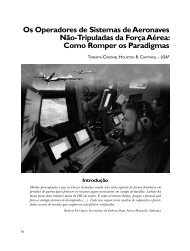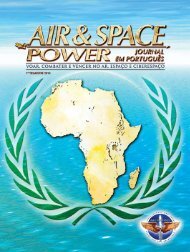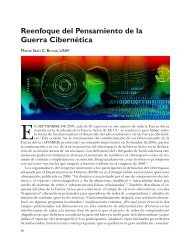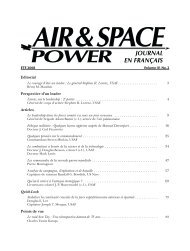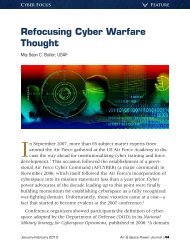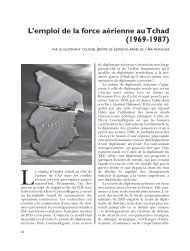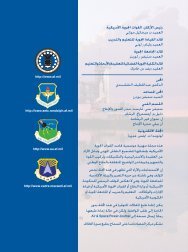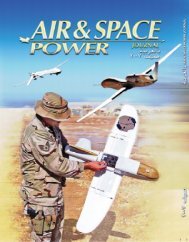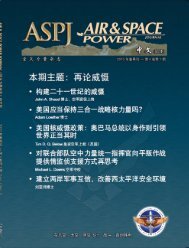112 AIR & SPACE POWER JOURNAL FALL <strong>2006</strong>tigious British Royal Navy, which enjoyed superiorityin weapons and technology. Thus,this article uses the Argentinian air componentas the center of gravity, without overlookingthe series of events leading to armed conflict,for the purpose of making connectionsbetween the evolving events and the philosophicalconcepts in Carl von Clausewitz’s OnWar. The interpretative complexity of thisbook is well known, but the article seeks tohighlight certain events to help us think aboutand track down the facts in a different way.This approach will also let us determine if theconcepts outlined in On War, dating from asfar back as 1831, still apply because history hasproven that military leaders base their decisionson the counsel of various thinkers, includingthe Prussian military strategist.Political Aspects and ObjectivesIn 1982 the political destiny of the Republicof Argentina lay in the hands of a military government(imposed after Maria Estela Martinezde Peron fell from power in 1976), with GenLeopoldo Fortunato Galtieri acting as presidentand army chief of staff. During the previousyear, Galtieri had replaced Gen Roberto Viola,and because of his professional background,everybody thought that his mandate would bemoderate, transitional towards democracy,and contrary to Argentina’s integration withthe nonaligned countries, thus negating anyrisk of a military campaign in the South Atlantic.However, the deteriorating economy inheritedfrom the previous government infusedin General Galtieri the idea of recovering theFalkland Islands, a British colonial bastionsince 1833, to reverse his government’s fortunesand cover up economic difficulties.Prime Minister Margaret Thatcher, a ConservativeParty representative, led Great Britainin 1982. Despite the fact that she had wona second term by a large margin, in March ofthat year her popularity declined because ofhigh unemployment (affecting more than twomillion persons) and economic problems; indeed,her government appeared destined tobecome the worst in British history. But thepossibility of winning an armed conflict such asthe one in the Falkland Islands would give hergovernment an opportunity to overcome thecrisis and restore British pride. According toClausewitz, “War is not merely an act of policybut a true political instrument, a continuationof political intercourse, carried on with othermeans.” 1 This definition applied to both governmentsbecause the war confronting themwould settle their diplomatic differences byother means and produce a political instrumentto overcome each country’s difficult internalsituation.On 2 January 1833, Capt John Onslow,commanding the corvette Clio, took possessionof the Falkland Islands on behalf of GreatBritain. Onslow took advantage of his militarysuperiority to force Capt Don Jose Maria Pinedo,commander of the Argentinian navy warshipSarandí, and his staff to leave the islands. Fromthat day, Argentina lost sovereignty over thoselands, starting a long diplomatic controversyto recover them.Created in 1945, the United Nations (UN)included in its charter (chap. 10) the “DeclarationRelative to Non-Autonomous States,”which asked member states to indicate whichcolonies they intended to decolonize. To Argentina’ssurprise, Great Britain included theFalkland Islands among the 43 possessions itoffered. 2 But not until 1965 did the UN GeneralAssembly approve Resolution 2065, invitingboth governments to negotiate the statusof the islands. This resolution created a greatpolicy dilemma for the British, who had to decidewhether to (1) fulfill the resolution andrecognize Argentinian sovereignty over theFalkland Islands because they did not haveevidential documentation, (2) start actions todelay complying with the resolution, or (3) preparefor an armed confrontation. 3 AlthoughGreat Britain chose the second option, excessivedelays risked unleashing the third one.Given Argentina’s internal political issues,delays in the negotiations with Great Britain,and the Argentinian government’s role in anincident involving the Armada de la RepúblicaArgentina (ARA) (Argentinian navy) shipBahía Buen Suceso in the South Sandwich Islands,Argentina pushed for implementation
CLAUSEWITZ AND THE FALKLAND ISLANDS AIR WAR 113of the Schematic Campaign Plan, which includeda military operation to recover theFalkland Islands but not keep them, thus definingthe Argentinian political goal of occupyingto negotiate. 4 Clearly, the Argentiniangovernment intended to avoid an armed confrontation,following Clausewitz’s observationthat “since war is not an act of senseless passionbut is controlled by its political object,the value of this object must determine thesacrifices to be made for it.” 5Therefore, on 2 April 1982, Argentina sent500 troops by sea and air to occupy the Falklands,establish a provisional government, andwait for Great Britain to initiate negotiationsto hand over the islands. 6 This action assumeda bloodless occupation, with the troops returningto the continent, leaving only a small garrisonin the islands. It also assumed that GreatBritain would not take military action to recoverthe islands; however, Argentina did notrealize that this operation gave the British governmentthe justification it needed to recoverthe islands and build a “Falkland Fortress,” designedby the Joint Chiefs of Staff. 7 Article 51of the UN charter would have legitimized aBritish military response as a “war of legitimatedefense, recognized as the right of a State todefend itself against an armed attack.” 8Nature of WarClausewitz created a model that definedthe nature of war: “As a total phenomenon itsdominant tendencies always make war a paradoxicaltrinity—composed of primordial violence,hatred, and enmity, which are to be regardedas a blind natural force; of the play ofchance and probability within which the creativespirit is free to roam; and of its element of subordination,as an instrument of policy, whichmakes it subject to reason alone.” 9 Accordingto Clausewitz, the first of these aspects appliesespecially to the people, the second to thecommander and his army, and the third to thegovernment.Argentina’s political goal of occupying tonegotiate produced Operation Rosario, basedon the Schematic Campaign Plan, designedfor execution no earlier than 15 May. Argentinachose this date arbitrarily, reasoning thatif Great Britain did react militarily to the occupation,its forces could not reach the FalklandIslands before 5 June, and by then, withwinter approaching, an amphibious landingwould prove impossible. The military junta assumedthat due to the Bahía Buen Suceso incidentat South Georgia Island, the Britishforces on the Falkland Islands would increase;therefore, they decided to move the occupationup to 2 April. 10The Argentinians’ reaction to the news ofthe successful occupation of the Falklands revivedtheir lethargic national pride and generatedunforeseen political events such as modifyingthe political goal that could be summedup as holding the islands and facing the RoyalNavy onslaught. Evidently, two of the threefactors in Clausewitz’s model—the governmentand the people—were mutually encouragedby the cause, but the armed forces hadthe responsibility to act despite many uncertainties.In this regard, Clausewitz notes that“these three tendencies are . . . deep-rooted intheir subject and yet variable in their relationshipto one another. A theory that ignores anyone of them, or seeks to fix an arbitrary relationshipbetween them would conflict with realityto such an extent that for this reason alone itwould be totally useless.” He adds that theproblem amounts to maintaining the theorysuspended between these three tendencies asbetween three magnets. 11 One factor—thearmed forces—opposed the other two, thusviolating this theory.Theory of WarTo Clausewitz, the theoretical principle ofwar planning involves reducing the enemy’spower as much as possible by annihilating hiscombat capability since “the destruction of theenemy forces is always the superior, more effectivemeans, with which others cannot compete.”12 Great Britain, on the other hand, hadsince 19 February 1976 considered three potentialcourses of action to defend the FalklandIslands: (1) proceeding without the use of aerial
- Page 2 and 3:
Chief of Staff, US Air ForceGen T.
- Page 4 and 5:
PIREPsJoint Airspace Management and
- Page 6 and 7:
APJInterdependenceKey to Our Common
- Page 8 and 9:
6 AIR & SPACE POWER JOURNAL FALL 20
- Page 10 and 11:
APJLT COL PAUL D. B ERG , USAF, CHI
- Page 12 and 13:
10 AIR & SPACE POWER JOURNAL FALL 2
- Page 14 and 15:
ASPJLT COL PAUL D. B ERG , USAF, CH
- Page 16 and 17:
True to form, the Air Force has res
- Page 18 and 19:
Red Flag Still Matters—After AllT
- Page 20 and 21:
Integration of Space-BasedCombat Sy
- Page 22 and 23:
est alternative. In other cases, un
- Page 25 and 26:
power projection, but advances in a
- Page 27 and 28:
3. Report of the Commission to Asse
- Page 29 and 30:
PIREP 27ized, programmed, funded, a
- Page 31 and 32:
PIREP 29creation of ACMs. One antic
- Page 33 and 34:
PIREP 31Link 16 and Joint Airspace
- Page 35 and 36:
PIREP 33Missile Defense Systems, th
- Page 37 and 38:
CADRE’s Professional EducationOpp
- Page 39 and 40:
ASPJQuick-LookThe Air Force Needs N
- Page 41 and 42:
QUICK-LOOK 39system should become a
- Page 43 and 44:
APJThe Air Force’s New Ground War
- Page 45 and 46:
THE AIR FORCE’S NEW GROUND WAR 43
- Page 47 and 48:
THE AIR FORCE’S NEW GROUND WAR 45
- Page 49 and 50:
THE AIR FORCE’S NEW GROUND WAR 47
- Page 51 and 52:
THE AIR FORCE’S NEW GROUND WAR 49
- Page 53 and 54:
THE AIR FORCE’S NEW GROUND WAR 51
- Page 55 and 56:
New USAF Doctrine PublicationAir Fo
- Page 57 and 58:
Counterinsurgency AirpowerAir-Groun
- Page 59 and 60:
COUNTERINSURGENCY AIRPOWER 57ticula
- Page 61 and 62:
COUNTERINSURGENCY AIRPOWER 59and Ai
- Page 63 and 64: COUNTERINSURGENCY AIRPOWER 61The af
- Page 65 and 66: COUNTERINSURGENCY AIRPOWER 63squadr
- Page 67 and 68: ASPJQuick-LookA New Operational Ass
- Page 69 and 70: QUICK-LOOK 67den on the OAT. First,
- Page 71 and 72: Filling the Stealth Gap and Enhanci
- Page 73 and 74: FILLING THE STEALTH GAP 71Each of t
- Page 75 and 76: FILLING THE STEALTH GAP 73the US wa
- Page 77 and 78: FILLING THE STEALTH GAP 75mit the F
- Page 79 and 80: Space PowerAn Ill-Suited SpaceStrat
- Page 81 and 82: SPACE POWER 79by using a more encom
- Page 83 and 84: SPACE POWER 81role of offensive and
- Page 85 and 86: SPACE POWER 83achieve supremacy in
- Page 87 and 88: Military TransformationEnds,Ways, a
- Page 89 and 90: MILITARY TRANSFORMATION 87to organi
- Page 91 and 92: MILITARY TRANSFORMATION 89course, w
- Page 93 and 94: MILITARY TRANSFORMATION 91mind-set
- Page 95 and 96: MILITARY TRANSFORMATION 93sponding
- Page 97 and 98: NOTAM 95The document’s authors ha
- Page 99 and 100: MOLECULAR NANOTECHNOLOGY AND NATION
- Page 101 and 102: MOLECULAR NANOTECHNOLOGY AND NATION
- Page 103 and 104: MOLECULAR NANOTECHNOLOGY AND NATION
- Page 105 and 106: MOLECULAR NANOTECHNOLOGY AND NATION
- Page 107 and 108: MOLECULAR NANOTECHNOLOGY AND NATION
- Page 109 and 110: ASPJQuick-LookThe Nature of Close A
- Page 111 and 112: QUICK-LOOK 109CAS missions. The pub
- Page 113: Clausewitz and the Falkland Islands
- Page 117 and 118: CLAUSEWITZ AND THE FALKLAND ISLANDS
- Page 119 and 120: CLAUSEWITZ AND THE FALKLAND ISLANDS
- Page 121 and 122: CLAUSEWITZ AND THE FALKLAND ISLANDS
- Page 123 and 124: BOOK REVIEWS 121whose contributions
- Page 125 and 126: BOOK REVIEWS 123Franco: Soldier, Co
- Page 127 and 128: APJAir and Space Power Journal, the
- Page 129 and 130: CONTRIBUTORS 127Col Howard D. “Da
- Page 131: EDITORIAL ADVISORY BOARDGen John A.



